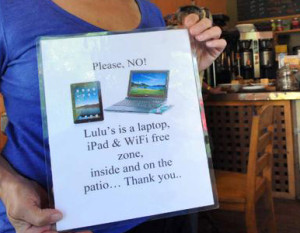Cafe Wi-Fi: No good deed goes unpunished.

Caféteurs* are facing a marketing dilemma. The ubiquitous availability of WiFi connections has made it almost as standard a requirement for a café’s amenities as restrooms and a full thermos of half-n-half. People need to be able to surf the Internet on their tablets and laptops while they enjoy the fare. Or they’ll just go someplace else. But the dilemma comes when those people won’t leave. Long after they’ve done with their coffee, they’re still there, taking up a table. It’s just rude. And new customers, coming in at peak times, see that the place is full and turn right around.
Damned if you do. Damned if you don’t.
One frustrated chain, Panera, has tried limiting access. An innovative company, Panera was one of the first café chains to offer free WiFi, long before Starbucks. And they’re one of the first to suffer the flood of WiFreeloaders.
The original marketing idea was to attract more customers, looking for faster connections than they get at home. But lately it’s starting to backfire. Customers won’t leave. Some won’t even buy drinks or food. They just come in, plop down, open up their laptop, and hog a table for hours. To discourage this, Panera is experimenting with a new policy: You now get 30 minutes of WiFi and then you’re cut off. This clears the tables, but it also pisses off regular customers, who always have a sense of entitlement from their weekly $1.47 coffee order.
I myself experienced this when I was meeting with a client at a Panera. We lost our connection in the middle of some online research we were doing, abruptly closing our meeting. It was like being kicked out of a conference room at Intel. My client was steamed and swore he’d never patronize Panera again. I suggested we move to the Starbucks across the street (no, that other one–no not that one, either, the one next to it) where we picked up where we left off on their free WiFi. But he still kept glaring back at the Panera, plotting his boycott.
Other solutions
An entrepreneur in Moscow, with Tsiferblat Café, is trying something radical (What? Radical? in Russia?) by charging for WiFi access but offering the food and coffee free. This is a riff on the old Las Vegas marketing model in which the drinks are free while you’re busy throwing away your kids’ hope of ever going to college. Of course, that model is based on the fact that drunks are more reckless about making wild bets, the life blood of any casino. We’ll see how well the Moscow marketing experiment goes.
I’m sure other caféteurs are trying different solutions to get these people who won’t leave to…well..leave. But also come back. Panera, according to some articles, is reportedly thinking of awarding free WiFi only to members of their frequent nosher program, MyPanera (don’t take the “my” literally). I can also see a promotion where you get a temporary log-in password entitling you to so many minutes depending on your “points” or the size of your tab. This would be a reverse of the 6th Unbreakable Rule; Give Love to Get Love–Get Love before you Give Love. It would still rankle customers who are not yet MyPanera members.
You can also do like Lulu de Carrone did at her Lulu’s coffee shop in New Haven, Connecticut and just ban laptops and WiFI altogether. Everyone predicted that she’d soon go out of business, but, partially thanks to an APM Marketplace story on NPR reporting on her Luddite stand (yes, pun intended), she says she’s busier than ever–as a haven for fellow Luddites, presumably. Ironically, we couldn’t help but notice when we visited Lulu’s website; you can still order your coffee online…just not on the premises.
Of course, it’s just wrong, to my socialist mindset, that we should have to depend on some retailers to provide WiFi at their own expense, even as a marketing ploy, for us iParasites. Their margins are thin enough as it is. Why isn’t WiFi a public utility yet? In some cities in the world (Seoul, for instance, with its citywide IEEE 802.16e WiMax) it’s been one for years. And the growth of 3G has made at least mobile access independent of WiFi. But until access truly does become like air–free–the burden of providing it is going to fall on the poor café operators.
Don’t abuse your host. Be a courteous guest.
But what can we, as customers do? Well, as patrons, we could just be more respectful of other people and not abuse the gift. This is part of the 6th Rule, too; giving love works both ways. When a restaurant starts to get crowded, we could look up from our screens and say, “Hmmm, maybe I should pack up and give someone else a seat.” Or if we were alone we could only occupy a small table instead of spreading out on a four-seater like I’ve seen a lot of people do. Or we could occasionally order another mocha or cookie.
Another thing we could do is something they’ve long done in Europe, the land of the rude waiter, where the tradition of the sidewalk café is centuries old. We could just sit down with strangers. If you’re at a table in a café in, say, Paris, or Venice, or Amsterdam, you’ll not be surprised when perfect strangers just sit down at the empty seats next to you. Of course, In North America, this just isn’t done. We respect each others’ space. That’s why our ancestors, with their anti-social genes, immigrated here to begin with; to get away from crowded, sidewalk cafés (and you thought it was for religious freedom). But there’s really nothing preventing us in the Seven Billion Strong 21st century from sitting down with a stranger who is only partially occupying a table. Given the North American tendency for being polite, the likelihood that person will get up and leave without causing a scene (we don’t do that either) is pretty high. We just don’t know how to confront rudeness like the self-respecting Parisian.
Finally, there’s always the effectiveness of the Full-Tray Hover. Try standing next to someone hogging a table with their iPad, passive-aggressively holding your full tray over them. They’ll get up and leave. You won’t even have to say anything.
*I’m taking a liberty here with this word caféteur. The French slang definition of “caféteur” is a stooly or squealer. But I don’t mean that; I mean a proprietor of a café, like a restauranteur runs a restaurant.
